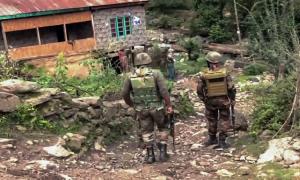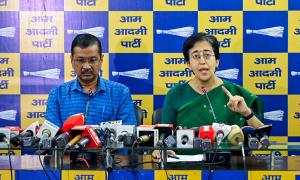Bangladeshi writer Taslima Nasreen dreams of setting up her home in Kolkata "to live, talk and dream in Bengali".
The writer, against whom Islamists in Bangladesh have issued a fatwa, discounted reservations by certain Muslim groups and clerics on her stay in West Bengal and asked: "Who are these people? Whom do they represent?"
Though her visit in January was for the launch of her latest autobiographical title Shei Shob Andhakar (Those dark Days), which was immediately banned in Bangladesh, she also took time off to meet people.
"I have found that they love me and are against my persecution," Nasreen said in an interview before leaving for London.
She holds that the banning of Dwikhondito (Split into Two) by the Left Front government in West Bengal did not have popular support. "People whom I met at the Kolkata book fair told me so. I have been getting hundreds of phone calls from people, including complete strangers who have expressed solidarity with me and want to meet me."
Nasreen said she planned to return to Kolkata possibly during the Durga Puja festival. "I know what Durga Puja means to a Bengalee."
The writer, who has received numerous international awards, recounted her childhood days in Mymansing. She said while certain norms and traditions of the patriarchal society and household, like covering one's head and face, shunning outsiders, intrigued her when she was about 10 to 12 years old, she came into her own during her days in college in the 80s, often raising hackles of elders and neighbours. "I did not consciously attempt to tread a different path but certain things, like going to college in an open rickshaw, caused outrage among some. I was sometimes thrashed by my parents, but my spirit refused to be cowed down."
The 42-year-old, who received her medical degree in 1984, said, "In a way my stint as editor of a literary magazine Senjuti in 1978-83 aided me in writing what I thought to be the best."
"I asked my girls my age about how they felt living a secluded, sheltered life and not being a free human being. This segregation rankled in me the most," she said.
Nasreen's's first book of poems was published in 1989.
The bouquets and brickbats from Bangladeshi readers began when her columns on women's oppression, discriminatory customs and traditions began appearing in major newspapers.
While street demonstrations against her began in 1990, a fundamentalist organisation put a price on her head in 1993 and she was forced to quit her job under government pressure, Nasreen recalled.
Finally she had to go into hiding in 1994 after the publication of Lajja, her book on atrocities on minority Hindus after the Babri Masjid demolition in 1992.








More from rediff